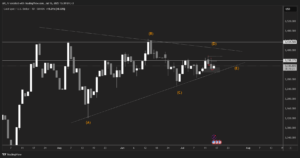S&P 500 is officially a “bear market”
Undoubtedly, the financial sector has been hit hard in 2022. The uncertainty caused by Russia’s military invasion in Ukraine, as well as the harsh lockdown measures imposed in Shanghai and Beijing, were overwhelming for the economy, with stock prices plummeting in all sectors – from technology to automobile manufacturers. Furthermore, the US Federal Reserve Bank has announced plans to further raise interest rates to fight galloping inflation. Expectedly, as of Monday, June 13th, bear market roars on Wall Street, with the S&P 500 closing more than 21% below its previous peak.
What is a Bear Market?
What does it take for the stock market to go into a “bear market”? Per Sam Stovall, Chief Investment Strategist at CFRA Research, the term was coined because bears hibernate; market-wise, this signifies a market that is retreating and has stopped moving forward. In essence, a bear market is when a stock index (e.g., the S&P 500, Nasdaq Composite, or the Dow Jones Industrial Average) drops 20% below its previous, most recent, high closing price. Since 1928, there have been 25 bear markets – historically, one of the worst declines in the stock market came during the stock market crash of 1929, with stocks plunging 86%. Other notable bear markets include the dotcom crash of 2000-2002 when the S&P 500 plummeted by 36.8% and the bear market from 2007-2009 which lasted 1.3 years and saw the S&P 500 dropping by 51.9%. The most recent bear market was also the most short-lived; between February and March 2020, the index declined by approximately 35%.
Last Monday, stock indexes took a serious plunge amid fears that a recession is looming on the horizon; the tech-heavy Nasdaq Composite fell 530.79 points (4.68%) to 10,809.23; Dow Jones Industrial Average shed 876.05 points to 30,515.74, and the S&P 500 tumbled 151.23 points (3.88%) to 3,749.63.
Surviving a bear market
Without a doubt, a bear market brings about ambiguity and uncertainty, impulsive actions, and of course, financial damage to some. To cushion losses or even make money in a bear market, the financial media website, Investopedia, provides some strategies to take into consideration, two of which are included here:
(1) Dollar-Cost Average: This is a long-term investment technique, whereby investors buy a fixed dollar amount of a target asset at regular intervals, irrespective of the asset’s share price. Doing so means that, eventually, you will be purchasing more shares when prices go down and less when share prices go up.
(2) Calibrate Risk: Consider the balance of risk and reward. Unquestionably, a higher account balance also means more to lose while in a bear market. Likewise, approaching retirement means less time to counterbalance any significant losses while in a bear market. For this reason, it is advised that investors who are close to retirement should follow a more conservative route to a bear market compared to the younger generation who, generally, have a smaller account balance and therefore less to lose but more time to compensate.
Overall, a bear market does not necessarily mean a recession, but it is still a good time to ensure that your assets are as risk-free as possible. And even though a bear market does not call for panic; yet, future steps should be organized, cautious, and thought through.
Disclaimer: This article is not investment advice or an investment recommendation and should not be considered as such. The information above is not an invitation to trade and it does not guarantee or predict future performance. The investor is solely responsible for the risk of their decisions. The analysis and commentary presented do not include any consideration of your personal investment objectives, financial circumstances, or needs.





